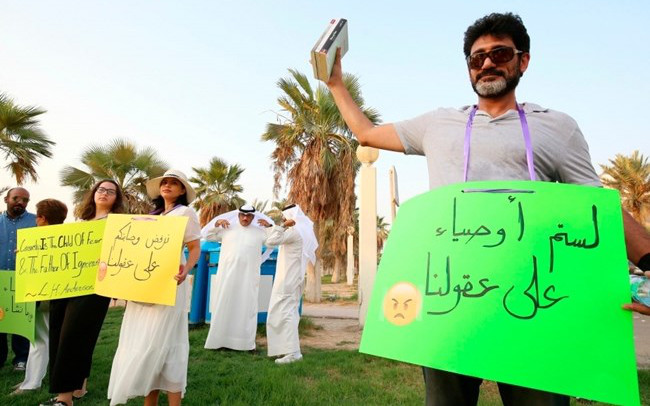On 14 September, Kuwaiti citizens took to the streets in anticipation of the upcoming November Kuwait Book Fair, protesting the kingdom’s increasing book bans. Protesters gathered at Irada Square, opposite the National Assembly, in Kuwait City after previously rallying outside the Ministry of Information. Kuwait, once considered a publishing hub, is still respected as a country of literary enthusiasts despite setbacks from the 1990s Iraq invasion. Recently, though, Kuwait’s Ministry of Information has a censorship committee working under the Law 3 for the Year 2006 on Press and Publication to censor an increasing number of books. In the past five years alone, 4,390 books have been outlawed in what was once known as the “pearl of the Gulf” in the 1960s and 1970s.
The upcoming Kuwait Book Fair will be overseen by the country’s censorship committee, making it an exception to the traditionally free spaces of Middle Eastern book fairs. For example, book fairs in the United Arab Emirates and Saudi Arabia often sell books that are banned from local book shops. In a time of e-books and pirated PDFs, it was thought that Middle Eastern book fairs were going out of business, but they have been revitalized due to the freedom the fairs provide book publishers and sellers. However, Kuwait’s book fair diverges from this pattern. Instead, it is forbidding the sale of books that contain potential offensive material or sensitive subjects, even from book fairs. Among the reasons the government censors books are words like “angels,” “thigh,” or “Satan,” or anything the Kuwaiti government believes is promoting unrest and threatening national security. In reality, this censorship restricts freedom of choice and counters efforts to prevent civil unrest. Recent additions to the list of banned books include Victor Hugo’s The Hunchback of Notre Dame and Gabriel García Márquez’s One Hundred Years of Solitude.
This month’s protest sought to bring attention to restrictions to freedom of choice and free thinking and it attracted authors and academics alike, including Dr. Fatima Al-Matar, a teacher at the Faculty of Law of Kuwait University. Dr. Al-Matar emphasized the protestors’ dedication, stating that “[w]e came today to say no to banning books and no to restricting free thinking and freedom.” Some of the protesters were banned authors themselves, explaining how the unavailability of their books in Kuwait was abnormal compared to their availability in other Middle Eastern countries. Online protesters have joined the dialogue, highlighting how many of the Kuwait’s banned books are still legal in Saudi Arabia, using hashtags like #Banned_In_Kuwait and #Don’t_Decide_For_Me to bring attention to this incongruity. On and offline, the protest’s main point is “freedom to choose” and to reject to government attempts to control freedom of thought.
In 2016, Bothayna Al-Essa, author of the banned book Maps of Wandering, addressed the Kuwaiti National Assembly and openly criticized the obstacles put in place for Kuwaiti authors. Kuwaiti authors now face obstacles including self-censorship just to get their books published. Meanwhile, readers must now find illegal or alternative ways to acquire banned books. Unfortunately, it is not only books falling victim to censorship in Kuwait. Certain CDs and music are banned to the extent that a Virgin Megastore had 60 per cent of their music of its music banned, forcing it to shut down. The overbearing suppression of literature and music is, it would seem, stifling the arts culture in Kuwait.
Kuwait used to be known for its freedom of political and personal expression, along with its vibrant arts culture, but since the Iraqi invasion in the 1990s, Kuwait’s liberal arts culture has deteriorated. The ban on 4,390 books and counting is indicative of this trend, leading Kuwaitis to protest as they did on 14 September for the right to read whatever book they choose without government interference. Kuwaiti English professor and writer Layla al-Ammar says, “Kuwait prides itself on being a democracy, but it should be remembered that democracy doesn’t begin and end with a ballot box. It extends, as a mode of thought and a way of life that prizes plurality and tolerance.” With this in mind, it is important that Kuwaitis continue to fight back and insist upon their right to choose and read in order to maintain their prominent arts culture. More importantly, if the Kuwaiti government should continue to think of itself as a free country, it must take protests to censorship seriously. The Ministry of Information should revise its policies on censorship, especially with regards to the upcoming Kuwait Book Fair. It should seek to promote freedom of thought and choice, rather than working to shelter itself from outside content and thought and limit the freedoms of its citizens.
Caroline Hickey is an Advocacy intern at ADHRB.





